You’ve probably heard of major corporations that started out, way back when, as an idea in somebody’s garage. And it’s true— ...
By having a target market, you can focus your marketing and branding towards them specifically.
We earn commissions if you shop through the links below. Read more
Written by: Esther Strauss
Esther is a business strategist with over 20 years of experience as an entrepreneur, executive, educator, and management advisor.
Edited by: David Lepeska
David has been writing and learning about business, finance and globalization for a quarter-century, starting with a small New York consulting firm in the 1990s.
Published on May 7, 2021

Investment range
$6,050 - $13,100
Revenue potential
$80,000 - $230,000 p.a.
Time to build
1 - 3 months
Profit potential
$40,000 - $90,000 p.a.
Industry trend
Growing
Commitment
Flexible
Here are the most important aspects of starting your firewood business:
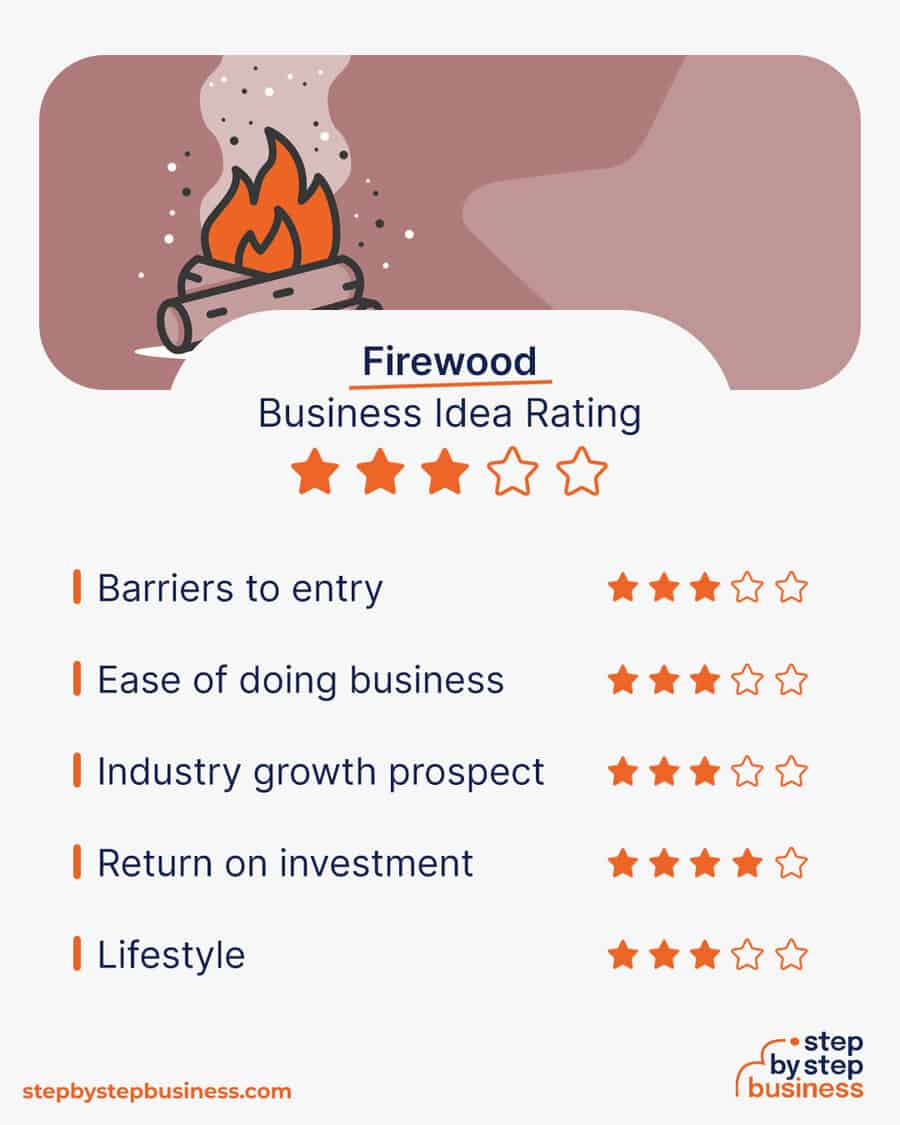
Before you start your firewood business, it’s a good idea to understand the industry as a whole so you can find the best opportunities.
To gain a balanced view of the firewood industry, you should consider both the pros and cons.
About 2% of US homes rely on wood for heating, according to the US Census Bureau ((https://www.census.gov/library/stories/2018/02/who-knew-wood-burning-fuel.html)). While this may seem like a small amount, in some US counties as much as 60% of homes are heated by a wood stove. Also, many other homes have fireplaces, and a good number of people and restaurants use wood for grilling and cooking.
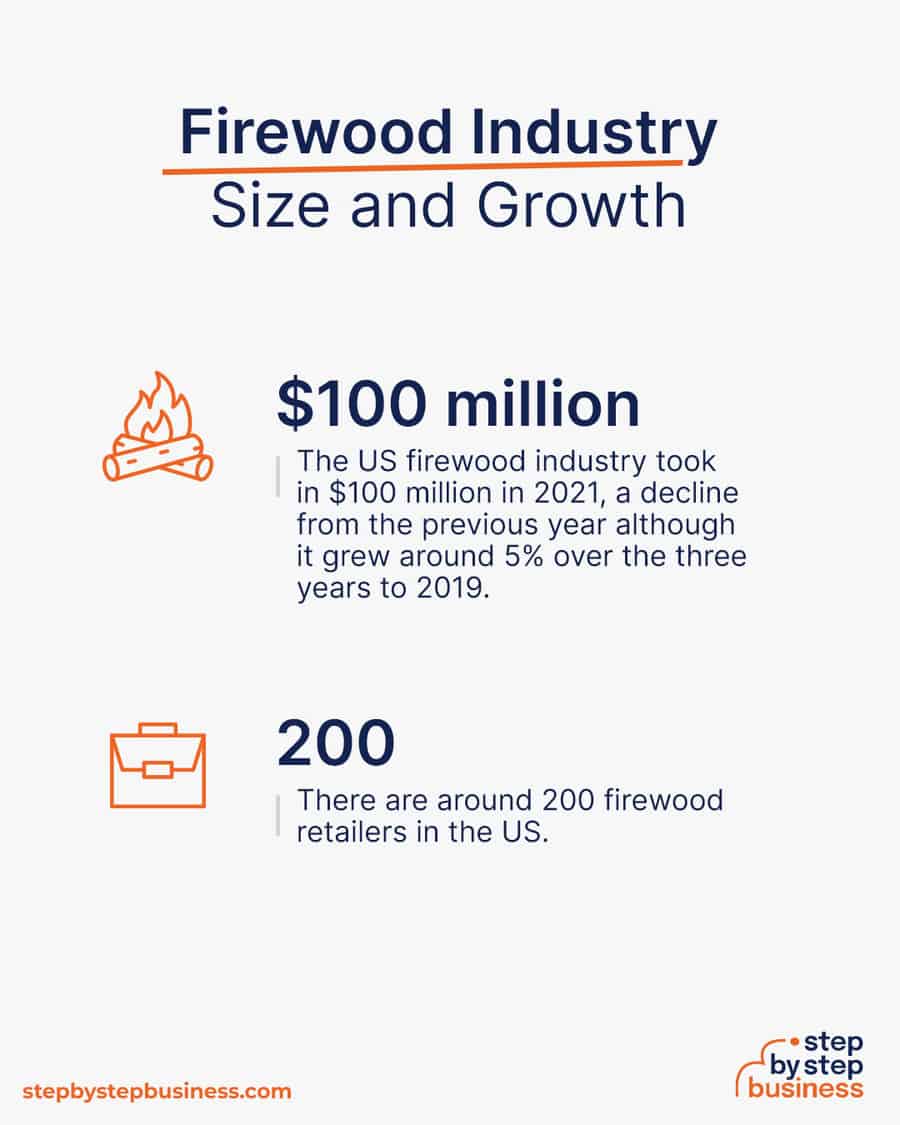
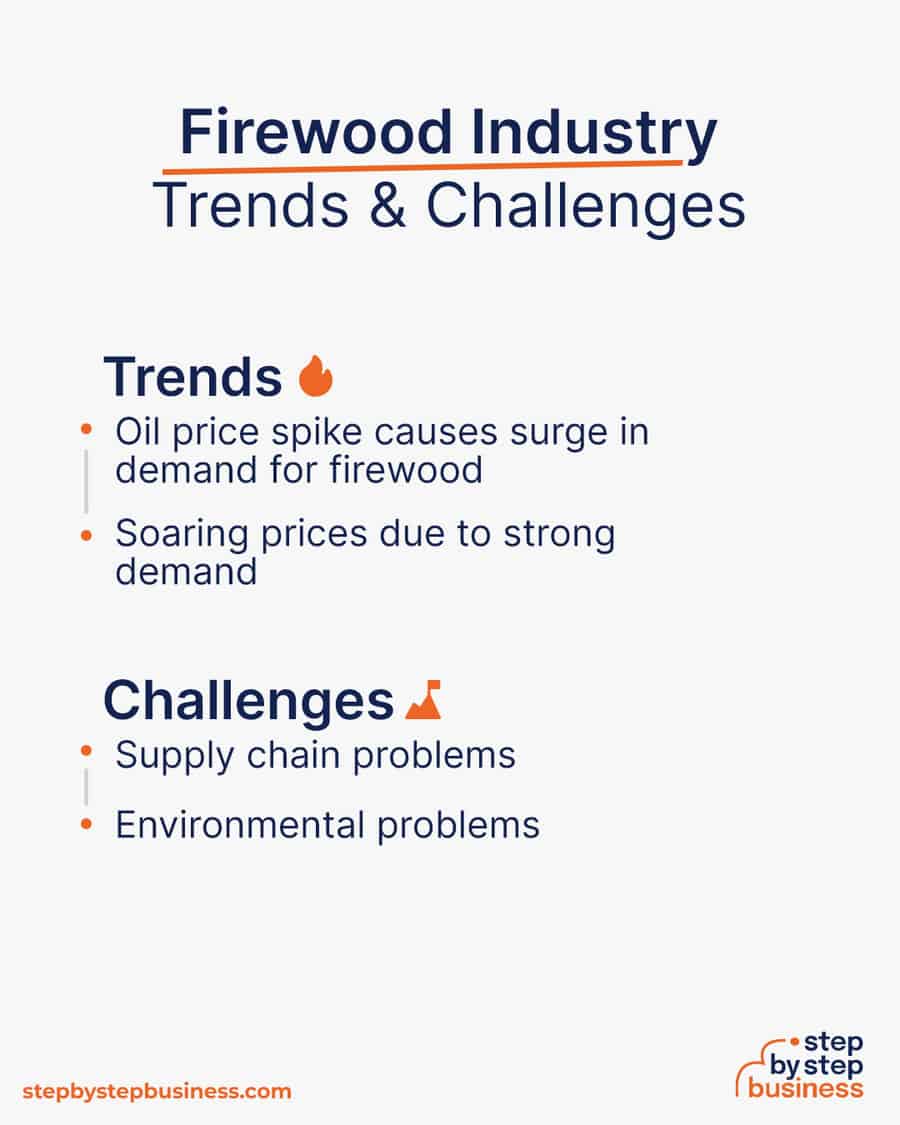
The latest industry trends include:
Some challenges faced by the industry are:
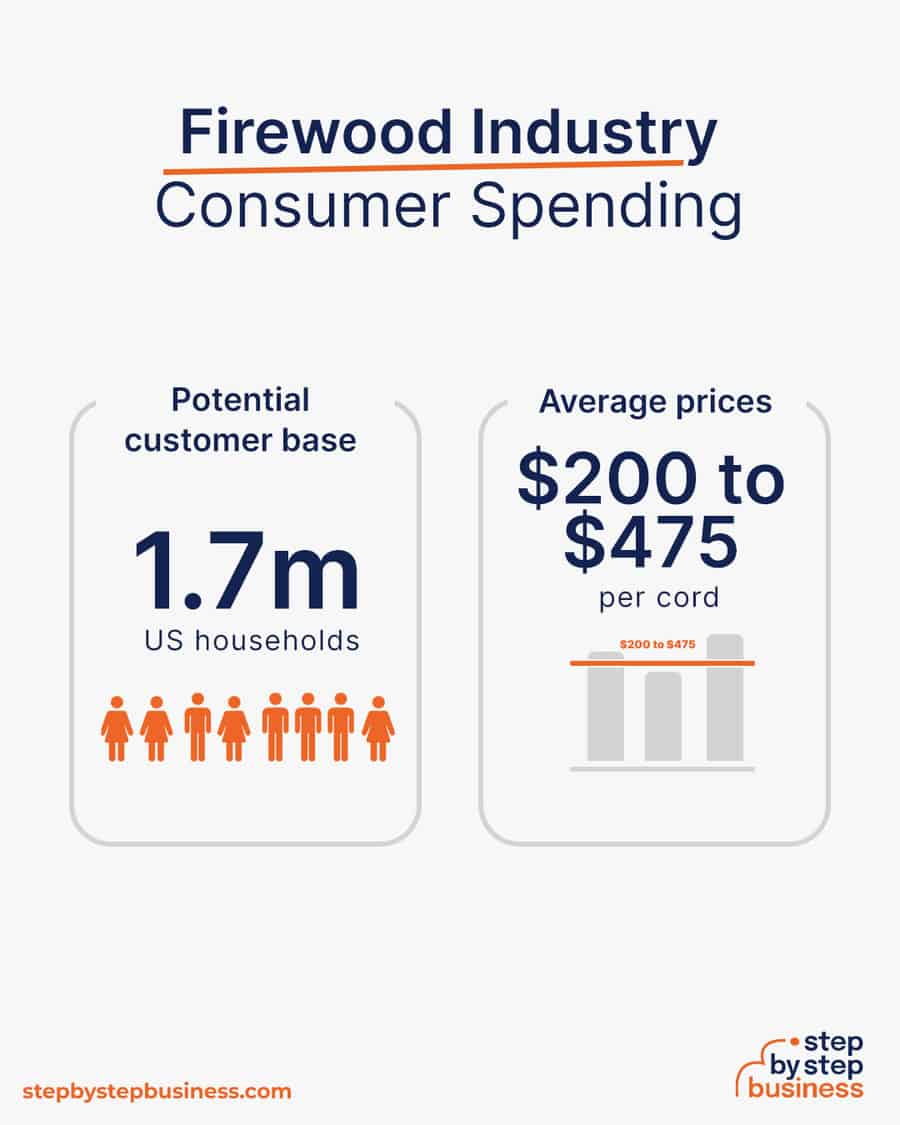
Starting a firewood business will likely cost between $8,500 and $60,000, with an average upfront investment of $30,000.
Your costs will vary depending on the brand and condition of the equipment you buy. But here’s an estimated cost breakdown for starting a firewood business, excluding the cost of a production facility:
| Start-up Costs | Ballpark Range | Average |
|---|---|---|
| Setting up a business name and corporation | $150 - $200 | 175 |
| Business licenses and permits | $100 - $300 | 200 |
| Business cards and brochures | $200 - $300 | 250 |
| Used truck | $2,000 - $5,000 | 3500 |
| Tools and equipment | $2,500 - $4,000 | $3,250 |
| Insurance | $100 - $300 | 200 |
| Website setup | $1,000 - $3,000 | 2000 |
| Total | $6,050 - $13,100 | $9,575 |
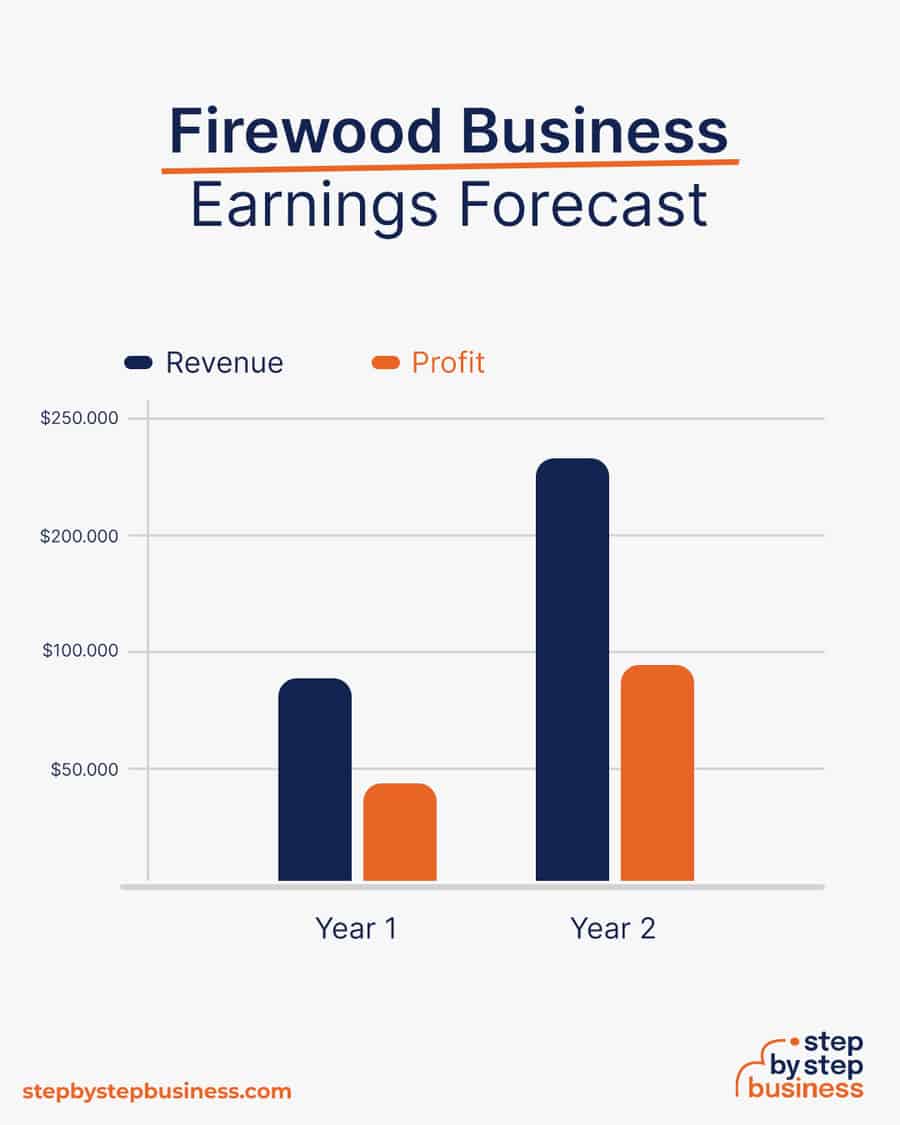
A cord is a stack of firewood measuring 128 cubic feet, or about 4 feet high, 4 feet wide, and 8 feet long. On average, a cord of ready-to-burn hardwood sells for $120 to $180, depending on your location and the wood quality. In some areas, when demand is high, a cord can be sold for as much as $400. So you’ll need to do some research to see what you can expect in your local area.
In your first year or two, you could work from home and sell 10 cords a week at $150 each, bringing in almost $80,000 in annual revenue. This would mean $40,000 in profit, assuming a 50% margin. As your brand gains recognition, sales could climb to 30 cords a week. At this stage, you’d rent a commercial space and hire staff, reducing your profit margin to around 40%. With annual revenue of around $230,000, you’d make a tidy profit of more than $90,000.
You could also sell firewood bundles which are much smaller—about 0.75 cubic feet. This will involve more work to wrap and deliver, but you can also charge more for your firewood.
Like many industries, there are a few barriers to overcome when selling firewood:
Now that you’ve learned a bit more about the industry, it’s time to start brainstorming the details of your business.
Market research will give you the upper hand, even if you’re already positive that you have a perfect product or service. Conducting market research is important, because it can help you understand your customers better, who your competitors are, and your business landscape.
Your competition will depend on who you decide to supply with firewood. If you want to sell directly to the public, then your competition could be grocery stores and other local wood sellers.
If you want to supply grocery stores and convenience stores, then your competition will be other firewood wholesalers.
Once you figure out who your competition will be, it’s time to do some research. Find out information such as the quality and type of firewood they sell, how much they charge, and who their main customers are.
Knowing this information will help you find gaps in the market, improve your customer targeting and create a better brand.
In general, starting a firewood business is already quite a niche market. But there may be options to specialize further depending on local demand.
One of these ways is by selling kiln-dried firewood. This is a way to treat your firewood that ensures it’s free from insects and improves the firewood quality. One major benefit of this niche is that it’ll be easier for you to sell your firewood outside of your state because your wood could not lead to insect infestation.
You could also specialize in the type of wood you sell, such as maple, oak, ash, and birch.
Above all, choosing a niche will help you build a brand identity and help you market your business.
How much you charge will depend on the quality, type, and quantity of split firewood you sell at one time. Since the price of a cord of firewood can range from $120 – $400, it’s hard to give you a definite number.
Another factor to consider is delivery fees. You could offer free delivery and price the difference into your product or add a fee depending on the distance. The choice is yours.
You’ll need to determine an acceptable average price for your local market and then tweak it based on the costs to produce your firewood.
Once you know your costs, you can use this Step By Step profit margin calculator to determine your mark-up and final price points. Remember, the prices you use at launch should be subject to change if warranted by the market.
Once you’ve got a niche, you can start thinking about who your ideal target market will be. If you live in a small town, though, this might not be possible due to a lower population, so you’ll have to service multiple types of customers.
But to give you an idea of the different firewood markets, here is a list:
By having a target market, you can focus your marketing and branding towards them specifically.
In turn, this will help increase your conversions and customer satisfaction.
You’ll want a business location that has enough space for storage and processing, yet is also close to your customers.
In the early stages, you may want to run your business from home to keep costs low, but make sure that your property is suitable. As your business grows, you’ll likely need to hire workers for various roles and may need to rent out a production facility. You can find commercial space to rent in your area on sites such as Craigslist, Crexi, and Instant Offices.
When choosing a commercial space, you may want to follow these rules of thumb:
Here are some ideas for brainstorming your business name:
Discover over 240 unique firewood company name ideas here. If you want your business name to include specific keywords, you can also use our firewood business name generator. Just type in a few keywords and hit “generate” and you’ll have dozens of suggestions at your fingertips.
Once you’ve got a list of potential names, visit the website of the US Patent and Trademark Office to make sure they are available for registration and check the availability of related domain names using our Domain Name Search tool below. Using “.com” or “.org” sharply increases credibility, so it’s best to focus on these.
Finally, make your choice among the names that pass this screening and go ahead with domain registration and social media account creation. Your business name is one of the key differentiators that set your business apart. Once you pick your company name, and start with the branding, it is hard to change the business name. Therefore, it’s important to carefully consider your choice before you start a business entity.
Here are the key components of a business plan:

If you’ve never created a business plan, it can be an intimidating task. You might consider hiring a business plan specialist to create a top-notch business plan for you.
Registering your business is an absolutely crucial step — it’s the prerequisite to paying taxes, raising capital, opening a bank account, and other guideposts on the road to getting a business up and running.
Plus, registration is exciting because it makes the entire process official. Once it’s complete, you’ll have your own business!
Your business location is important because it can affect taxes, legal requirements, and revenue. Most people will register their business in the state where they live, but if you are planning to expand, you might consider looking elsewhere, as some states offer real advantages when it comes to firewood.
If you’re willing to move, you could really maximize your business! Keep in mind, it’s relatively easy to transfer your business to another state.
Business entities come in several varieties, each with its pros and cons. The legal structure you choose for your firewood business will shape your taxes, personal liability, and business registration requirements, so choose wisely.
Here are the main options:

We recommend that new business owners choose LLC as it offers liability protection and pass-through taxation while being simpler to form than a corporation. You can form an LLC in as little as five minutes using an online LLC formation service. They will check that your business name is available before filing, submit your articles of organization, and answer any questions you might have.
Choose Your State
The final step before you’re able to pay taxes is getting an Employer Identification Number, or EIN. You can file for your EIN online or by mail or fax: visit the IRS website to learn more. Keep in mind, if you’ve chosen to be a sole proprietorship, you can simply use your social security number as your EIN.
Once you have your EIN, you’ll need to choose your tax year. Financially speaking, your business will operate in a calendar year (January–December) or a fiscal year, a 12-month period that can start in any month. This will determine your tax cycle, while your business structure will determine which taxes you’ll pay.
The IRS website also offers a tax-payers checklist, and taxes can be filed online.
It is important to consult an accountant or other professional to help you with your taxes to ensure you are completing them correctly.
Securing financing is your next step and there are plenty of ways to raise capital:
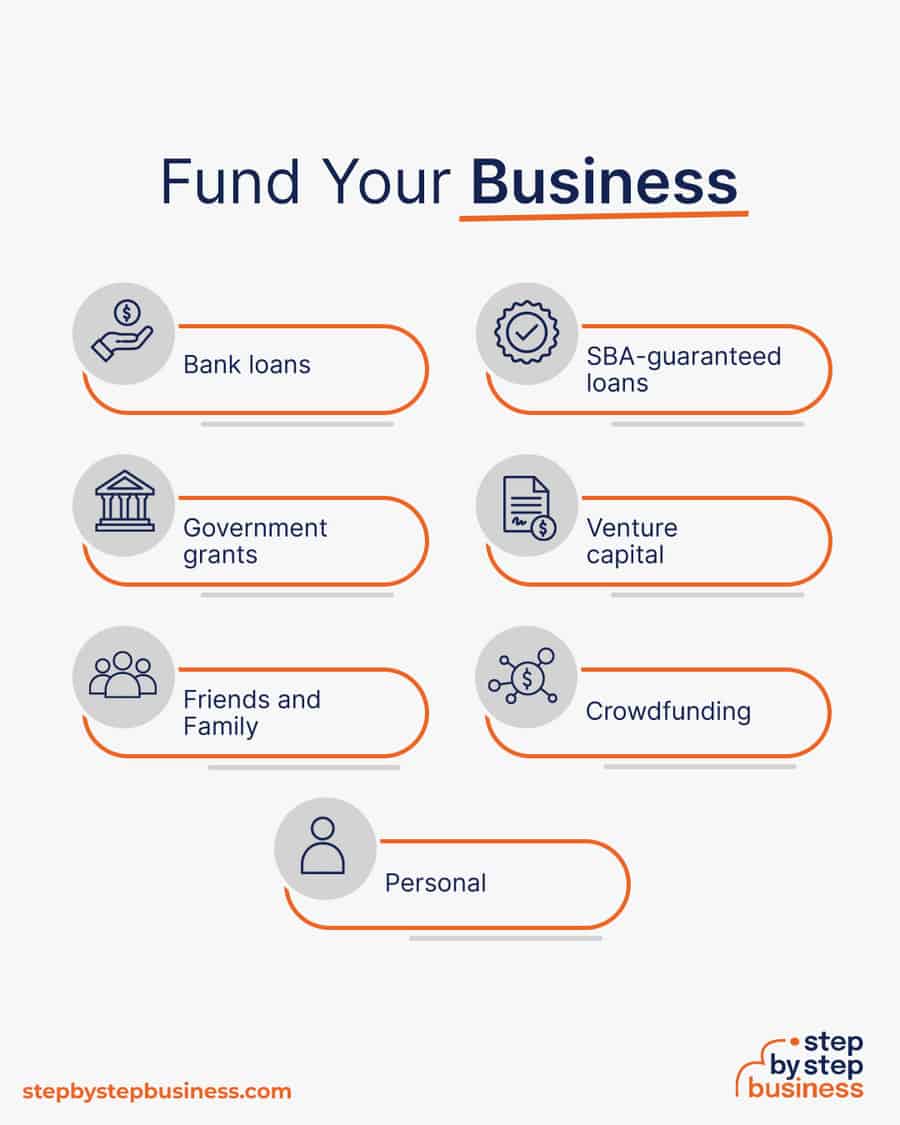
Bank and SBA loans are probably the best option, other than friends and family, for funding a firewood business. You might also try crowdfunding if you have an innovative concept.
Starting a firewood business requires obtaining a number of licenses and permits from local, state, and federal governments.
Federal regulations, licenses, and permits associated with starting your business include doing business as (DBA), health licenses and permits from the Occupational Safety and Health Administration (OSHA), trademarks, copyrights, patents, and other intellectual properties, as well as industry-specific licenses and permits.
You may also need state-level and local county or city-based licenses and permits such as a seller’s permit and a firewood cutting permit if you cut trees on public land. The license requirements and how to obtain them vary, so check the websites of your state, city, and county governments or contact the appropriate person to learn more.
You could also check this SBA guide for your state’s requirements, but we recommend using MyCorporation’s Business License Compliance Package. They will research the exact forms you need for your business and state and provide them to ensure you’re fully compliant.
This is not a step to be taken lightly, as failing to comply with legal requirements can result in hefty penalties.
If you feel overwhelmed by this step or don’t know how to begin, it might be a good idea to hire a professional to help you check all the legal boxes.
Before you start making money you’ll need a place to keep it, and that requires opening a bank account.
Keeping your business finances separate from your personal account makes it easy to file taxes and track your company’s income, so it’s worth doing even if you’re running your firewood business as a sole proprietorship. Opening a business bank account is quite simple, and similar to opening a personal one. Most major banks offer accounts tailored for businesses — just inquire at your preferred bank to learn about their rates and features.
Banks vary in terms of offerings, so it’s a good idea to examine your options and select the best plan for you. Once you choose your bank, bring in your EIN (or Social Security Number if you decide on a sole proprietorship), articles of incorporation, and other legal documents and open your new account.
Business insurance is an area that often gets overlooked yet it can be vital to your success as an entrepreneur. Insurance protects you from unexpected events that can have a devastating impact on your business.
Here are some types of insurance to consider:

As opening day nears, prepare for launch by reviewing and improving some key elements of your business.
Being an entrepreneur often means wearing many hats, from marketing to sales to accounting, which can be overwhelming. Fortunately, many websites and digital tools are available to help simplify many business tasks.
You may want to use industry-specific software, such as GoCanvas and Arborgold to track sales and manage your business.
Website development is crucial because your site is your online presence and needs to convince prospective clients of your expertise and professionalism.
You can create your own website using website builders. This route is very affordable, but figuring out how to build a website can be time-consuming. If you lack tech-savvy, you can hire a web designer or developer to create a custom website for your business.
They are unlikely to find your website, however, unless you follow Search Engine Optimization (SEO) practices. These are steps that help pages rank higher in the results of top search engines like Google.
Here are some powerful marketing strategies for your future business:

Unique selling propositions, or USPs, are the characteristics of a product or service that set it apart from the competition. Customers today are inundated with buying options, so you’ll have a real advantage if they are able to quickly grasp how your firewood meets their needs or wishes. It’s wise to do all you can to ensure your USPs stand out on your website and in your marketing and promotional materials, stimulating buyer desire.
Global pizza chain Domino’s is renowned for its USP: “Hot pizza in 30 minutes or less, guaranteed.” Some signature USPs for your firewood business could be:
You may not like to network or use personal connections for business gain. But your personal and professional networks likely offer considerable untapped business potential. Maybe that Facebook friend you met in college is now running a firewood business, or a LinkedIn contact of yours is connected to dozens of potential clients. Maybe your cousin or neighbor has been working in logging for years and can offer invaluable insight and industry connections.
The possibilities are endless, so it’s a good idea to review your personal and professional networks and reach out to those with possible links to or interest in firewood. You’ll probably generate new customers or find companies with which you could establish a partnership. Online businesses might also consider affiliate marketing as a way to build relationships with potential partners and boost business.
If you’re starting out small from a home office, you may not need any employees. But as your business grows, you will likely need workers to fill various roles. Potential positions for a firewood business would include:
At some point, you may need to hire all of these positions or simply a few, depending on the size and needs of your business. You might also hire multiple workers for a single role or a single worker for multiple roles, again depending on need.
Free-of-charge methods to recruit employees include posting ads on popular platforms such as LinkedIn, Facebook, or Jobs.com. You might also consider a premium recruitment option, such as advertising on Indeed, Glassdoor, or ZipRecruiter. Further, if you have the resources, you could consider hiring a recruitment agency to help you find talent.
You’re now ready to start your entrepreneurial journey with your firewood business. Firewood should be easy to sell because most people need it, especially during cold days and nights. But you might expect a few bumps in the road in your first year or two, while you’re still learning the ropes and building up your business.
It’s important that you go the extra mile for your customers to develop a good business reputation and inspire customer loyalty. You’ll get new customers too without having to spend more on advertising and marketing.
To price firewood, research local market rates and consider your costs for harvesting and delivery. Set a competitive price that covers your expenses and allows for a profit, adjusting as needed based on market conditions.
Generally speaking, the best types of firewood would be hardwoods due to their burning qualities. Hardwoods burn hotter and longer than other types of wood, which will naturally make your customers happier.
The short answer is yes. If there is demand in your area, you are willing to put in the work to sell a quality product, and you take care of your customers, you will be able to make money.
Selling firewood can be profitable, particularly if you have a reliable source of wood and a strong customer base. Profitability depends on factors such as the cost of acquiring or harvesting wood, processing and storing it, and the local demand and pricing for firewood.
Firewood can be a good side business, especially if you have access to a consistent supply of wood and a market for firewood in your area. It can provide an additional income stream with relatively low startup costs.
The fastest-growing wood species for firewood depend on various factors such as climate, soil conditions, and local availability. Some fast-growing options include hybrid poplar, willow, and eucalyptus.
The best wood size for burning depends on the intended use and appliance. Generally, firewood is cut into lengths of 12 to 16 inches (30 to 40 cm) for residential heating purposes. However, larger sizes may be required for commercial or industrial applications.
Firewood can indeed become too dry, which can affect its burning characteristics. Extremely dry wood may burn too quickly, producing excess heat or causing the fire to burn out faster. It’s ideal to store firewood in a well-ventilated area to allow some moisture content to remain, which helps with combustion and heat output.
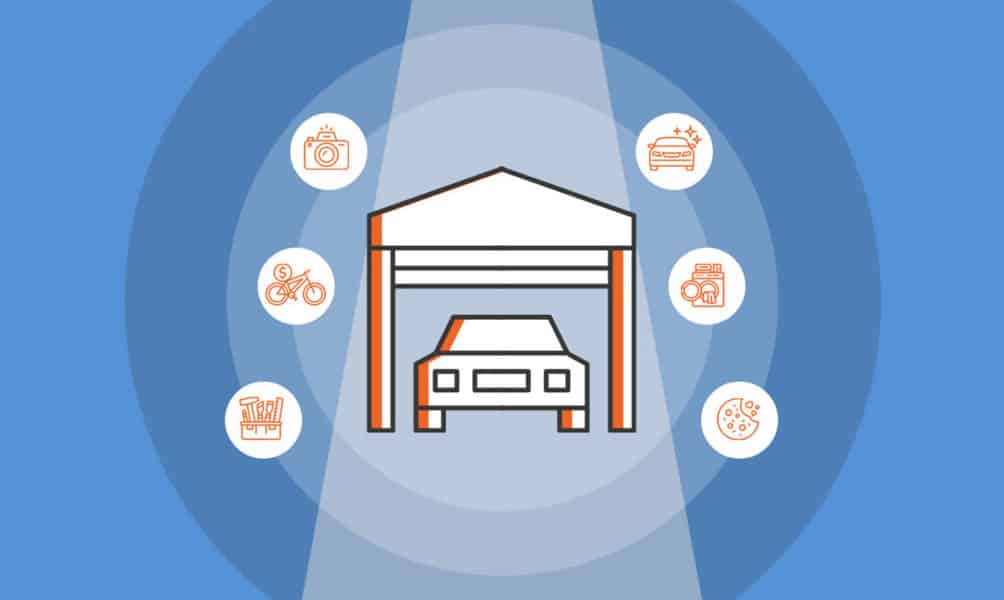
Published on July 21, 2022
You’ve probably heard of major corporations that started out, way back when, as an idea in somebody’s garage. And it’s true— ...
Read Now
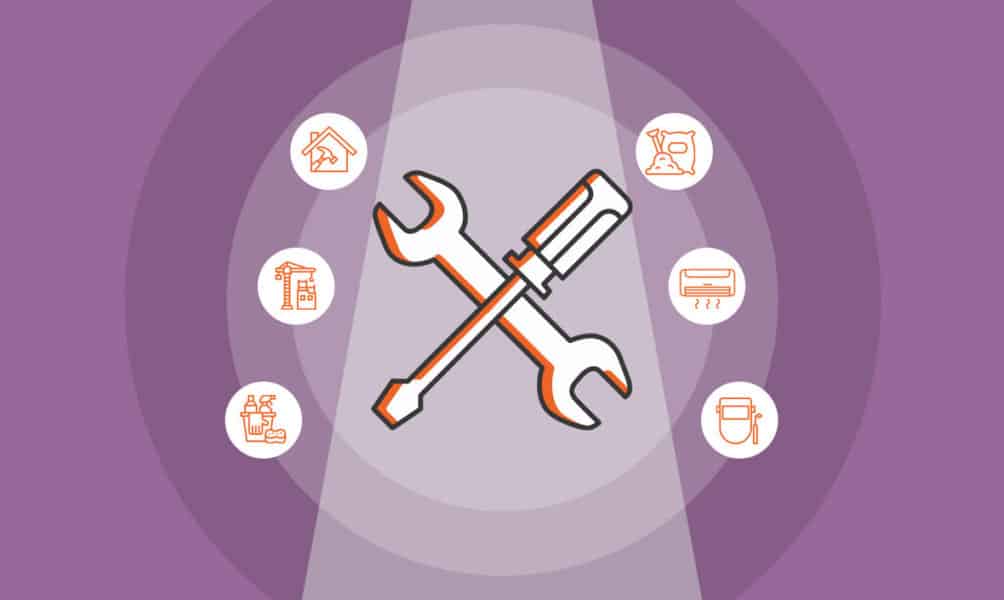
Published on July 21, 2022
The US handyman industry is worth a stunning $4 billion and growing, with demand for all variety of domestic services on the rise as the number ofho ...
Read Now
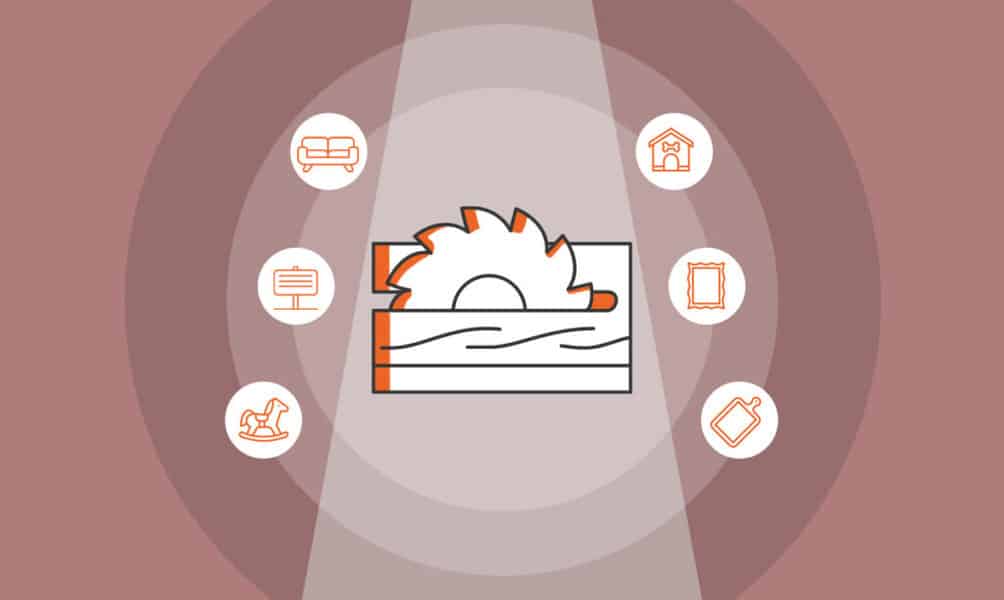
Published on June 16, 2022
If you’re a passionate woodworker, doing your own woodworking projects at home, have you ever considered starting a woodworking business? Youk ...
Read Now
No thanks, I don't want to stay up to date on industry trends and news.
Comments